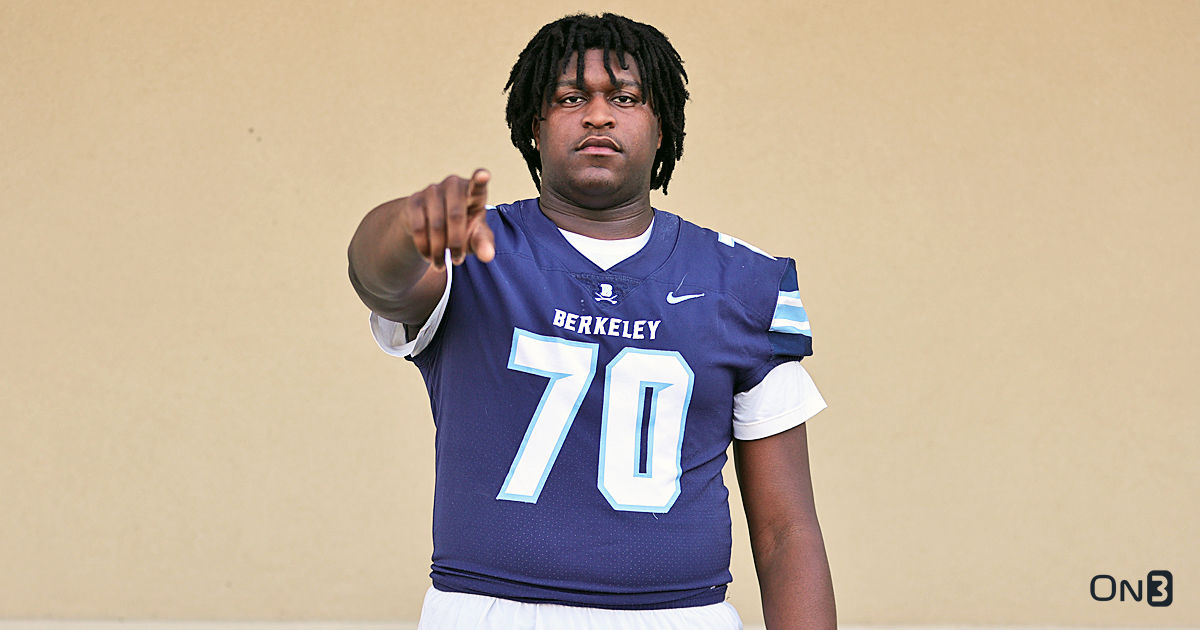Why Did 4-Star OT Johnnie Jones Decommit from UCLA?

Published: 2025-09-14 17:32:10 | Category: Trump GNEWS Search
In a significant shift within the college football recruiting landscape, four-star offensive tackle Johnnie Jones has decommitted from UCLA following the dismissal of head coach DeShaun Foster. This move has stirred interest among various collegiate programs, particularly as Jones, ranked the No. 132 overall prospect in the 2026 cycle, returns to the market.
Last updated: 30 October 2023 (BST)
Key Takeaways on Johnnie Jones' Decommitment
- Johnnie Jones was committed to UCLA since June 9, 2023.
- His decommitment comes after the firing of head coach DeShaun Foster.
- Jones is ranked as the No. 132 overall prospect and No. 10 offensive tackle for the 2026 recruiting cycle.
- Florida State is expected to be a strong contender for his commitment.
- Jones' previous finalists included Ole Miss, Penn State, Colorado, and Vanderbilt.
The Context of His Decommitment
Johnnie Jones, from Bradenton, Florida, had committed to UCLA after a strong official visit to Los Angeles, where he felt a connection with the programme's future. His father, Johnnie Jones Sr., highlighted the appeal of UCLA's long-term vision both on and off the field. However, the recent coaching change has prompted Jones to reconsider his options.
Why the Coaching Change Matters
The firing of DeShaun Foster, who had led UCLA since 2021, significantly impacts the Bruins' recruiting strategy. Under Foster, the team had secured 22 commitments, creating a class that ranked No. 23 nationally. Changes in coaching often lead to shifts in player commitments as recruits reassess their fit with new leadership.
Jones' Recruitment Timeline
Jones' recruitment has been a focal point since his commitment in June 2023. His decision to decommit comes at a crucial time in the recruiting calendar, where early signing periods are approaching. The uncertainty surrounding UCLA's coaching staff could accelerate interest from other programmes, especially those that had previously been in contention for Jones’ commitment.
Potential Destinations for Johnnie Jones
As Jones reopens his recruitment, several programmes are poised to make their move. Florida State appears to be at the forefront, given their ongoing communication with Jones and his status as an in-state prospect. Other schools that were finalists during his initial commitment—Ole Miss, Penn State, Colorado, and Vanderbilt—could also be in the mix.
Florida State: A Leading Contender
Florida State has a storied football tradition and is actively rebuilding its programme. The Seminoles have consistently produced NFL talent and could offer Jones a compelling path to success. Their coaching staff, known for developing offensive linemen, may appeal to Jones' aspirations of playing at the next level.
Other Programmes to Watch
Beyond Florida State, schools like Ole Miss and Penn State have shown interest in Jones. These programmes offer strong offensive schemes and recent successes that could entice him. Colorado, under new head coach Deion Sanders, is also becoming a destination for top recruits, making them a potentially intriguing option for Jones.
The Impact of Rankings
According to the Rivals Industry Ranking, Johnnie Jones is not only the No. 10 offensive tackle but also the No. 18 player in Florida. These rankings reflect his skill set and potential, making him a highly sought-after recruit. The attention he receives from college programmes is indicative of his ability to impact games at the collegiate level.
Jones' Skill Set and Potential
Jones is known for his impressive size and athleticism, standing at 6 feet 5 inches and weighing around 300 lbs. His agility and footwork allow him to excel in both pass protection and run blocking, vital skills for a modern offensive tackle. As he navigates this new chapter, his performance in upcoming high school games will be closely monitored by scouts and coaches alike.
What’s Next for UCLA?
UCLA now faces the challenge of rebuilding its recruiting class following this decommitment. The programme will need to quickly establish new relationships with recruits to maintain a competitive edge. The loss of Jones, a key piece in their offensive line strategy, may prompt the Bruins to seek other prospects to fill that gap.
Future Prospects for UCLA’s Recruiting Class
Despite the setback, UCLA has a robust recruiting network and resources that could help them bounce back. They will likely focus on securing commitments from other talented offensive linemen to rebuild their class before the early signing period. The coaching staff will need to establish a clear vision to attract recruits in a highly competitive environment.
Conclusion: The Significance of Jones’ Decision
Johnnie Jones' decommitment from UCLA is a pivotal moment in the 2026 recruiting cycle. As he explores new opportunities, the decision highlights the fluid nature of college football recruiting, especially amid coaching changes. His next steps will be closely watched, as they could impact both his future and the recruiting landscape for the programmes vying for his talent.
FAQs
Why did Johnnie Jones decommit from UCLA?
Johnnie Jones decommitted from UCLA following the firing of head coach DeShaun Foster. The change in leadership prompted him to reassess his commitment to the programme.
Which schools are interested in Johnnie Jones now?
Florida State is a leading contender for Johnnie Jones' commitment, along with Ole Miss, Penn State, Colorado, and Vanderbilt, which were his finalists before his initial commitment to UCLA.
What are Jones' rankings among recruits?
Johnnie Jones is ranked as the No. 132 overall prospect and the No. 10 offensive tackle in the 2026 recruiting cycle, as per the Rivals Industry Ranking.
What skills does Johnnie Jones possess as a player?
Jones is known for his size, agility, and footwork, making him effective in both pass protection and run blocking, essential traits for a top offensive tackle.
How does coaching change affect recruiting?
Coaching changes can significantly impact recruiting as players reassess their fit with new leadership and the direction of the programme, often leading to decommitments and shifts in interest.



